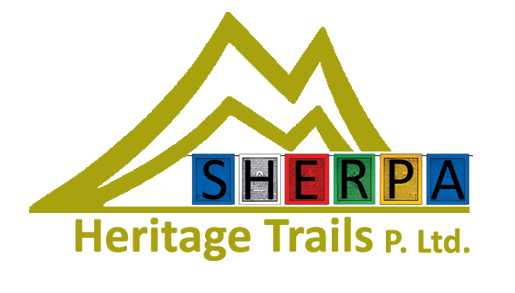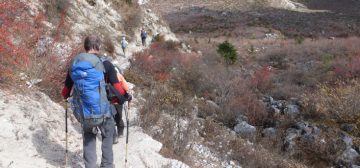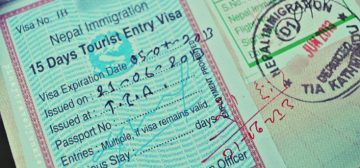Nepal Travel Guide and FAQ’s
Home Nepal Travel Guide and FAQ’s
Nepal Travel Guide and FAQ's
Frequently Asked Questions
How will I know Sherpa Heritage Trails is a legal trekking agency?
All legal and certified trekking agencies of Nepal must be registered at the Nepal Department of Culture, Tourism, and Civil Aviation. So we pay taxes.
Also, a registry at TAAN is compulsory. TAAN means Trekking Agencies Association of Nepal. You can find our registry here.
We are also a member of the NMA, Nepal Mountaineering Association. You can find our registry at the NMA here.
On top of all, our guides have completed training at KEEP the Kathmandu Environmental Education Project.
Managing director Gomba Sherpa has been a personal member of TAAN and the NMA for over 25 years.
What is the difference between a teahouse trek and a camping trek?
During a teahouse trek, you hike daily from teahouse to teahouse. Here, you’ll have your food and drinks, and you’ll spend the night in a basic room. You have western toilets and sometimes only squat toilets. Teahouse treks are usually more visited by tourists than camping treks.
During a camping trek, you hike daily from one campsite to another. You will receive 3 meals every day, tea& coffee with cookies, and, if possible, fresh fruit. A toilet tent will be set up each day at the campsite, and sometimes it is possible to use a basic toilet at a local teahouse. Camping treks are in remote areas where you will hardly meet any other tourists.
How long do I hike per day?
On average, you you’ll hike 4 to 7 hours per day. This includes lunch stops and short rest breaks. Sometimes a trekking day will be longer, depending on the distance between teahouses or campsites. Please check our web page about Trek Grading for more information.
How fit do I have to be to do a trek?
If you are physically and mentally fit to walk for 5 to 6 hours on moderate trails, you are qualified for trekking in Nepal. To gain fitness level we do suggest you have some physical fitness such as running, jogging, hiking, etc a few months before your trek. For a general impression of trekking grade you can also visit our webpage about Trek Grading.
What are the basic requirements for peak climbing or expedition?
You will need an excellent level of fitness to participate fully in these high mountain adventures. Good cardio fitness, which for most people requires some training, can be achieved through running, hiking, and perhaps some gym work. Preferably, this level of adventure has been a long-term interest, but if not, you have set a program of fitness preparation with at least three months’ lead time to your trip.
Also, you need previous experience in mountain climbing using ropes, crampons, and an ice axe. The only peak you do not require previous mountaineering experience is Mera Peak because there are no technical difficulties during the climb.
How about altitude sickness during the trek?
On treks over 3000 meters, there is always the risk of altitude sickness or acute mountain sickness. It is important to acclimatize during trek and drink plenty of water. If you suffer from a headache, dizziness, nausea, or any other health complaint, you must tell your guide. All our guides are trained and qualified in first aid and know very well what to do if you are suffering from altitude sickness. For more information about altitude sickness, visit our webpage about Health and Acute Mountain Sickness.
What if I do get sick during the trek/or if I have to visit a doctor or hospital?
All our guides are trained and qualified in first aid. Sometimes trekkers may get diarrhea as well as sprains and muscle aches. In such a case, our guide will advise you about any health requirements and will also help you treat your illness. If necessary, they will take you to the nearest health post.
If you need a helicopter or jeep rescue, they will contact the head office of Sherpa Heritage Trails. We can arrange a rescue for you. The cost of the rescue is for the travel insurance or the client. All clients must have travel insurance that covers helicopter rescue and evacuation. Also, it is very important that you check with your travel insurance company about the altitude at which they will allow a rescue.
Do I have to bring my own First Aid kit?
Sherpa Heritage Trails has a basic First Aid kit available. But we do recommend bringing your own. Suggestions for your First Aid kit can be found on the download Checklist Trekking.
Is there an age limit for joining your treks?
No, there is no age limit. If you are fit, you are able to enjoy the trails in Nepal. At a certain age, we do suggest some milder altitudes.
How about kids on trek?
If you book a trek with your kids, we strongly suggest hiring an extra porter for your children. This porter will stay with your children during each trekking day, and carry your child if they get tired. Sherpa Heritage Trails has a high level of experience with young children, and some porters are very soft and kind with children. At the end of the trek, your child does not want to say goodbye!
What is the best season for a trek in Nepal?
In general, the best season is right after the monsoon. From October until December, the skies are clear because all the dust has washed away during the monsoon. The temperatures are mild and perfect for trekking. From December until January, the skies are still clear, but at higher altitudes, it can be quite cold. From February until May is the spring season. Particularly beautiful because of the flowering rhododendrons.
Is it possible to trek during the monsoon period?
Yes, it is possible to trek during the monsoon ( July/August/mid-September). Dolpo and Upper Mustang are even better in the monsoon because they are on the shadow side of the Himalaya.
What kind of food will be served during the trek?
In teahouses, you can get both local and limited Western food like pastas and pizza. There are always vegetarian options available. In more remote areas, you will eat local food like dhal baht (rice and lentils), curries, chapattis, and noodles.
If you are doing a camping trek, we offer standard meals, often vegetarian meals.
If you have any dietary requirements, please let us know in advance to make the necessary arrangements.
Do I need to bring a water filter?
If you have one, great, take it with you. It will save a lot of waste from plastic bottles. During the teahouse trek, you can buy safe drinking water in bottles or filtered drinking water. During the camping trek, we will boil water for you.
What kind of equipment should I bring for a trek?
We have a packing list available for you. You can download it here. Packing list for trekking in Nepal
What kind of hiking shoes do I need for my trek?
We recommend hiking boots with ankle support, which reduces the risk of injury, especially at higher altitudes. It is important that your boots are comfortable, well-worn-in, and not brand new. We do not recommend trekking in sandals, tennis shoes, or using new boots prior to the trek.
Do I have to bring my own sleeping bag during the trek?
Yes, we strongly recommend bringing your own sleeping bag. Most teahouses have 1 or 2 blankets in the rooms, but in tourist season, there are no extra blankets available. Bring a sleeping bag with a comfort temperature up to -10 °C. It is possible to hire sleeping bags from us.
Can I hire equipment in Nepal?
Yes, you can hire equipment in Kathmandu and Pokhara. You can rent sleeping bags and down jackets. We do recommend bringing the basic equipment from your home country because the quality of equipment is far less reliable in Nepal.
Do I have to carry my own bag during the trek?
During your trek, you only have to carry a day pack. A porter will carry 10 kg of luggage for you.
Can I store my luggage when I am on a trek?
Nearly all hotels have a luggage deposit. It is also possible to store your luggage at the office of Sherpa Heritage Trails. After you come back from your trek, we will hand over your luggage to you. It is also possible to store your luggage at the hotel in Pokhara.
Can I send a message home during trek?
The reach of the mobile network signal in Nepal is getting quite extended. At the famous trails and treks, you can use your mobile phone. During these treks, there will only be a few days when you are unable to connect to the network. Often in teahouses, Wi-Fi is available, but this depends on electricity and the quality of the Wi-Fi connection. During treks in remote areas like Dolpo and Kanchenjunga, the facilities are far less, and it sometimes will take a week or more before you are able to contact home.
Your guide will regularly contact the head office in Kathmandu to check for any messages.
Is it possible to take a hot shower during the trek?
Yes, during the teahouse trek, you can take a hot shower. However, the hot water comes from solar boilers; if the boiler is empty, a hot shower turns into a cold shower. Often, a warm bucket shower is possible as well.
Is it possible to charge my phone, camera or powerbank during a trek?
Yes, in teahouses, electricity is available. Often, teahouses charge a fee; the fee varies from 100 rupees to 500 rupees. If you own a power bank, we recommend bringing it.
How about trekking staff welfare?
On all treks, our company has proper medical & emergency rescue insurance for all our staff. We make sure they have proper clothing and shoes, and provide them with proper clothing and shoes if needed. This is part of our Responsible Tourism policy.
Are there any ATM’s in Nepal?
Yes, in Kathmandu, Pokhara, and Lukla you can find ATM’s. Sometimes they are out of order, but generally, you can get cash money. We do recommend not cashing large amounts at one time. You can also exchange foreign currency at local money exchangers. They often use an exchange commission, which is cheaper than the bank. During the trek, it is not possible to go to an ATM or a money exchanger.
How much money do I have to take with me on the trek?
You only have to pay for alcoholic beverages, soft drinks, and snacks. We recommend €20,00 ( in Nepali Rupee currency) per person per day.
Do I need a visa to visit Nepal?
Yes, all foreign nationals, except Indian citizens, need a visa to enter Nepal. You can get your visa at the Nepalese Embassy or Consulate in your home country. For more detailed information, please check our webpage.
How many extra days should I allow in case of flight cancellation?
If you are flying from a remote mountain strip like Lukla, Paphlu, Jomsom, Simikot, Taplejung, and Dolpo, you should keep at least 2 spare days before your international departure home.
Who will cover the additional days if we are delayed due to flight cancellations?
Clients have to pay themselves for the extra costs. Please refer to our Booking Terms & Conditions for more information.
What is your payment policy?
You can check out all the details about deposits and payments on Payment Modes.



